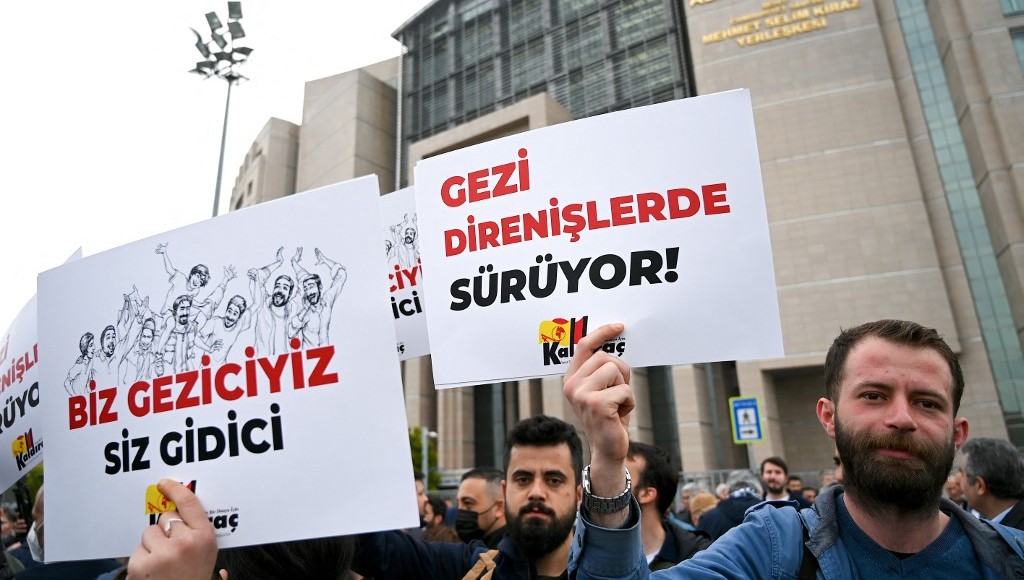A Turkish appellate court’s decision to uphold the conviction of activist and philanthropist Osman Kavala, a leading critic of President Recep Tayyip Erdoğan, and seven other defendants in a trial concerning the Gezi Park protests of 2013 has attracted condemnation from opposition parties.
An İstanbul court on April 25 sentenced Kavala, who had been behind bars without a conviction for over four years, to life in prison without the possibility of parole on conviction of attempting to overthrow the government by financing street protests in 2013, while jailing seven other defendants — Mücella Yapıcı, Can Atalay, Tayfun Kahraman, Çiğdem Mater, Mine Özerden, Hakan Altınay and Yiğit Ali Ekmekçi — for 18 years each for aiding in the attempt.
The appellate court on Wednesday ruled that the April verdict “complied with the law.”
The defense can still appeal the case at Turkey’s Supreme Court of Appeals.
The court’s upholding of the sentences attracted criticism from prominent opposition politicians, who once again questioned the independence of the judiciary under the increasingly authoritarian rule of Erdoğan and argued that the decision was politically motivated.
“Damn you and the dirty scheme you set up,” main opposition Republican People’s Party (CHP) leader Kemal Kılıçdaroğlu said in a tweet addressed to Erdoğan and his ruling Justice and Development Party (AKP).
Kılıçdaroğlu also vowed to “bring justice” to Turkey and reunite Vera, daughter of the convicted Kahraman, with her father when his party comes to power following the elections slated for June 2023.
Lanet olsun size de kurduğunuz kirli düzene de. Adaleti bu ülkeye getireceğiz! Vera’yı babasına kavuşturacağız! https://t.co/F3Nb3IaN19
— Kemal Kılıçdaroğlu (@kilicdarogluk) December 28, 2022
The party’s deputy group chairman, Özgür Özel, also said the decision was not accepted by the “conscience” of the Turkish nation, adding that it will eventually be proven “unlawful” by the courts.
Bu hukuksuz kararlar, milletin vicdanından dönmüştür. Yargı kararlarıyla da er geç bu cezaların hukuksuz olduğu tescillenecektir.
Gezi tertemiz bir süreçtir ve siyasi talimatlarla verilen yargı kararları bu süreci kirletemeyecektir.#GeziyiSavunuyoruz https://t.co/z4cbhreIwc
— Özgür Özel (@eczozgurozel) December 28, 2022
Ebru Günay, spokesperson for the pro-Kurdish Peoples’ Democratic Party (HDP), on Thursday said during a press conference that the Gezi trial had been full of “unlawful [judgments] and irregularities” and that the latest ruling indicated once again that the AKP government had turned the judiciary into “a tool for revenge.”
“Those who turn the judiciary into a tool should know that Gezi gave hope to people [in Turkey]. … We will continue to stand by the Gezi resistance,” she added.
“The court decision for the Gezi defendants, which was issued upon the order of the palace [Erdoğan], is illegitimate and null and void,” the Turkish Workers’ Party (TİP) said in a tweet.
Gezi tutsakları için Saray’dan gelen talimatla çıkartılan mahkeme kararı gayri meşru ve hükümsüzdür.
Saray kaybedecek, Gezi kazanacak! pic.twitter.com/efCVIWjfZW
— Türkiye İşçi Partisi (@tipgenelmerkez) December 28, 2022
The Gezi Park demonstrations, which took place in the summer of 2013 in reaction to the AKP government’s attempt to destroy one of the few green spaces left in İstanbul, quickly turned into a nationwide protest against the authoritarian policies of then-prime minister and current president Erdoğan.
Eleven protestors died and thousands more were injured as they were brutally suppressed by the police on Erdoğan’s instructions.
Kavala’s years-long trial has damaged NATO member Turkey’s strategic but sometimes uneasy ties with its main Western allies since his unexpected arrest in October 2017.
Kavala was then best known as a soft-spoken businessman who was spending part of his wealth on promoting culture and projects aimed at reconciling Turkey and its arch-nemesis Armenia.
But Erdoğan portrayed him as a leftist agent of the Hungarian-born US billionaire George Soros, who was using foreign money to try and overthrow the state.



